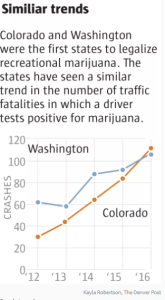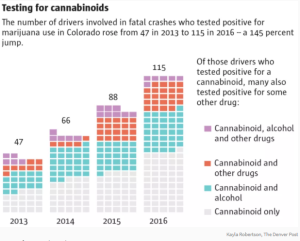
SAM Statement Regarding The Denver Post’s New Stoned Driving Analysis
Today, Smart Approaches to Marijuana (SAM), the leading nonprofit, nonpartisan group dedicated to advancing evidence-based marijuana laws in the U.S., issued the following statement from SAM President Dr. Kevin Sabet in response to The Denver Post’s new analysis indicating the number of marijuana-impaired drivers involved in fatal crashes in Colorado has more than doubled since 2013, the year after the state voted to legalize recreational use of the drug:
“Pot-related traffic crashes continue to skyrocket in the era of legalization, while Big Marijuana keeps raking in profits. Colorado is failing to keep its roads safe, yet many state officials insist on keeping their rose-colored glasses on. It’s clear that non-governmental groups need to start stepping up to raise awareness on the fallout accompanying the widespread commercialization of marijuana. Over the next few months, SAM will convene traffic safety and other prevention and treatment partners in order to spread awareness about the sizable road safety consequences of marijuana legalization.”
The new analysis finds Colorado saw a 40 percent increase in the number of all drivers involved in fatal crashes between 2013 and 2016, and a 145 percent increase in the number of marijuana-impaired drivers involved in fatal crashes in the same period, which The Post notes is a conservative estimate because “state law does not require coroners to test deceased drivers specifically for marijuana use in fatal wrecks – some do and some don’t.”
Other key findings from The Post’s analysis include:
- Marijuana is figuring into more of Colorado’s fatal crashes overall. In 2013, marijuana-impaired drivers accounted for 10 percent of all fatal crashes. By 2016, it was 20 percent.
- More Colorado drivers are testing positive for marijuana alone. Of the marijuana-impaired drivers involved in fatal crashes in 2014, about 52 percent had no alcohol in their system. By 2016, it had grown to 69 percent.
- In Adams County, Colorado’s fifth-most populous county, marijuana-impaired drivers killed in crashes only occasionally showed THC levels higher than 5 ng/mL in 2015. In 2016, these levels routinely reached more than 30 ng/mL.
The Post quotes Deputy District Attorney of Colorado’s 18th Judicial District Rich Orman, who said “[w]e’ve definitely seen an increase in the number of DUI cases in which marijuana is involved. And that’s been just since the legalization of recreational marijuana.”
Colorado resident Barbara Deckert, whose fiancée, Ron Edwards, was killed in 2015 in a collision with a driver who tested positive for marijuana use and charged only with careless driving, said “I never understood how we’d pass a law without first understanding the impact better. How do we let that happen without having our ducks in a row? And people are dying.”
Over the next year, SAM will continue to monitor and act on this issue in all states and organize relevant partners for action.
In addition to increased drugged driving crashes, research demonstrates that marijuana legalization is producing a significant increase in other health and safety costs. For example, states with legal marijuana are seeing an increase in youth marijuana use. States that have legalized marijuana have also failed to shore up state budget shortfalls with marijuana taxes, continue to see a thriving illegal black market, and are experiencing unabated sales of alcohol, despite campaign promises from advocates promising that marijuana would be used as a “safer” alternative instead.
About SAM
Smart Approaches to Marijuana (SAM) is a nonpartisan, non-profit alliance of physicians, policy makers, prevention workers, treatment and recovery professionals, scientists, and other concerned citizens opposed to marijuana legalization who want health and scientific evidence to guide marijuana policies. SAM has affiliates in more than 30 states.


